Majorities in both parties say Trump administration must stop an action if a federal court rules it is illegal
With President Donald Trump’s second term approaching its 100-day mark, 40% of Americans approve of how he’s handling the job – a decline of 7 percentage points from February.

And, even as Trump continues to receive high marks from his strongest supporters, several of his key policy actions are viewed more negatively than positively by the public:
- 59% of Americans disapprove of the administration’s tariff increases, while 39% approve.
- 55% disapprove of the cuts the administration is making to federal departments and agencies, while 44% approve.
Trump’s use of executive authority also comes in for criticism: 51% of U.S. adults say he is setting too much policy via executive order. Far smaller shares say he is doing about the right amount (27%) or too little (5%) through executive orders.
Note: This survey was conducted after Trump’s April 2 announcement of sweeping new tariffs on nearly all U.S. trading partners, which triggered several days of volatility in U.S. and global stock markets. The survey was in the field on April 9 when Trump paused tariffs on most countries but levied higher rates on China. Americans’ opinions (including those about the economy and tariffs) were largely unchanged throughout the April 7-13 field period.
With many of the administration’s actions facing legal challenges in federal courts, there is widespread – largely bipartisan – sentiment that the administration would have to end an action if a federal court deemed it illegal.
- 78% say the Trump administration should have to follow a federal court’s ruling, rising to 88% if the Supreme Court were to issue the ruling.
- 91% of Democrats and 65% of Republicans say the administration would need to stop an action if a federal court ruled it illegal, rising to 95% of Democrats and 82% of Republicans for a Supreme Court ruling.
However, the latest national survey by Pew Research Center, conducted April 7-13 among 3,589 adults, finds much wider partisan differences in evaluations of Trump’s overall job performance and some key policies.
Seven-in-ten or more Republicans and Republican-leaning independents approve of:
- Trump’s job performance (75%)
- The administration’s cuts to government (78%)
- Increased tariffs (70%)
- Ending diversity, equity and inclusion (DEI) policies in the federal government (78%)
By comparison, even wider majorities of Democrats and Democratic leaners disapprove of:
- Trump’s job performance (93%)
- The administration’s cuts to government (89%)
- Increased tariffs (90%)
- Ending DEI policies in the federal government (86%)
Trump’s job rating compared with his first term and his predecessors
Trump’s current approval rating of 40% is on par with his rating at this point in his first term. It remains lower than other recent presidents’ approval ratings in the early months of their presidencies.
 Among Trump’s predecessors dating back to Ronald Reagan, the only other leader who did not enjoy majority approval at his 100-day mark is Bill Clinton (49% approval in April 1993).
Among Trump’s predecessors dating back to Ronald Reagan, the only other leader who did not enjoy majority approval at his 100-day mark is Bill Clinton (49% approval in April 1993).
In April 2021, Joe Biden’s job approval rating stood at 59% – though it would drop substantially to 44% by September of that year.
In their own words: How Americans view the first months of Trump’s presidency
Asked to describe what they like most – and least – about the administration’s actions so far, similar topics come up in both questions, though to different degrees.
Immigration actions

Trump’s immigration actions top the list of what Americans say they like most about the administration: 20% point to immigration, including 7% who specifically mention Trump’s deportation actions. But immigration actions, including deportations, also are cited by 11% of Americans as the thing they like least about the administration.
Related: Americans’ Views of Deportations
Approach to governing
About two-in-ten Americans (22%) describe an aspect of Trump’s governing approach as what they like least about the administration. This includes mentions of “carelessness” (3%), Cabinet and other staffing picks (2%), perceived targeting of law firms and universities (2%), and terms like “authoritarian” or “dictator” (3%). Conversely, 11% of Americans cite his “keeping promises” or “getting things done” as what they like most.
Tariffs and cuts to government
Tariffs and trade policy (15%) and government cuts (11%) are both mentioned by at least one-in-ten Americans as actions they like least. But these are also volunteered by sizable shares (6% and 9%, respectively) as aspects of Trump’s presidency they like most.
Views of cuts to the federal government
As the administration continues to plan and implement large-scale reductions across federal agencies, 59% of Americans say it is being “too careless” in how it makes these cuts. And the public is more likely to see the cuts having negative, rather than positive, effects.
- 51% say the cuts will make the government run worse, while 36% say they will make the government run better.
- 48% expect the cuts will cost Americans money in the long run. Fewer (41%) say the cuts will save money.
Other key findings

The public’s economic outlook has turned more negative. While current overall economic evaluations are unchanged from February, Americans are now more likely to say the economy will be worse a year from now (45% now, up from 37% then).
Read Chapter 4 for more on economic views.
Confidence in Trump’s handling of the economy – long a relative strength – has declined. Today, 45% express confidence in Trump to make good decisions about the economy, his lowest rating on this measure in Pew Research Center surveys dating back to 2019. Still, Trump’s economic rating remains higher than Biden’s was throughout his presidency. About half (48%) express confidence in Trump on immigration – his highest-rated issue.
Half of Americans say Trump’s policies are weakening U.S. standing in the world compared with Biden’s policies. About four-in-ten (38%) say Trump’s policies are putting the U.S. in a stronger position internationally. Views of the impact of Trump’s policies on the economy are nearly identical.
Read Chapter 1 for more on Trump’s handling of issues.
Related: Americans Give Early Trump Foreign Policy Actions Mixed or Negative Reviews
The GOP is viewed more favorably than the Democratic Party, a shift from recent years. Views of the Republican Party have trended more positive over the last year, and 43% now have a favorable view. Views of the Democratic Party are little changed over the last few years, with 38% now expressing a favorable view.

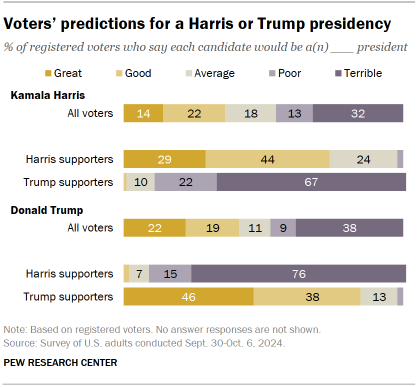
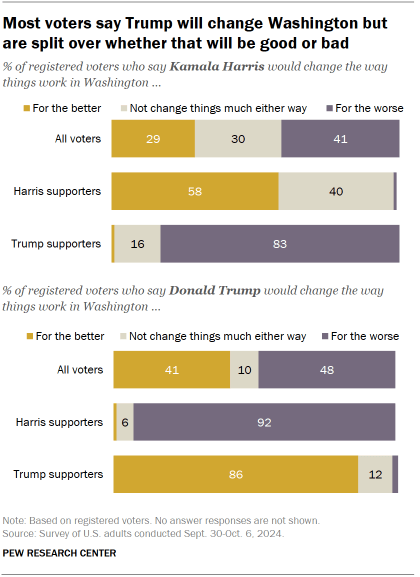
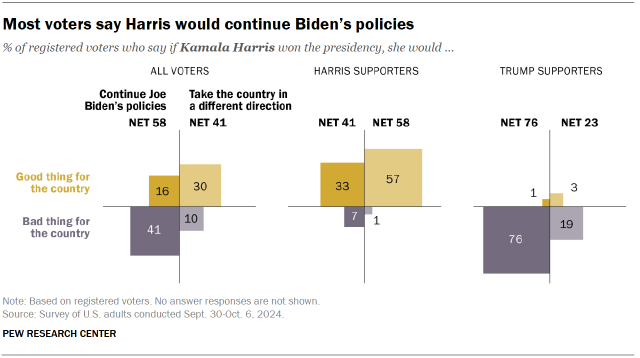
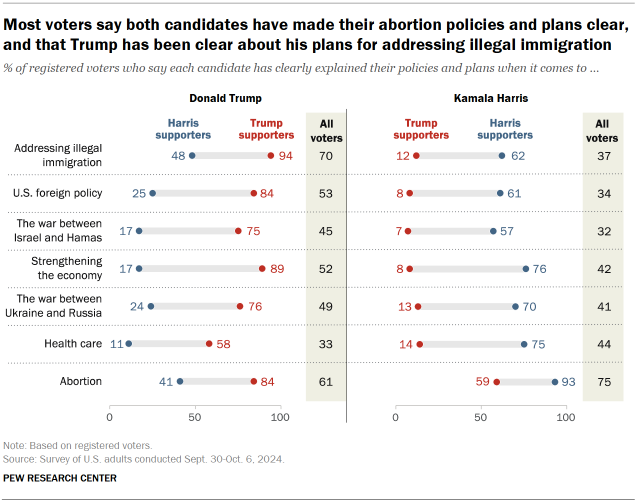
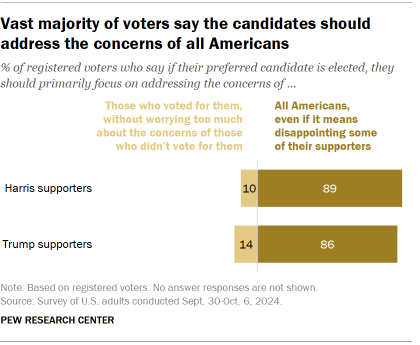
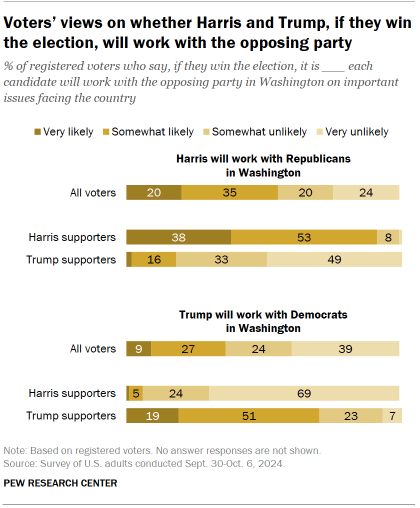

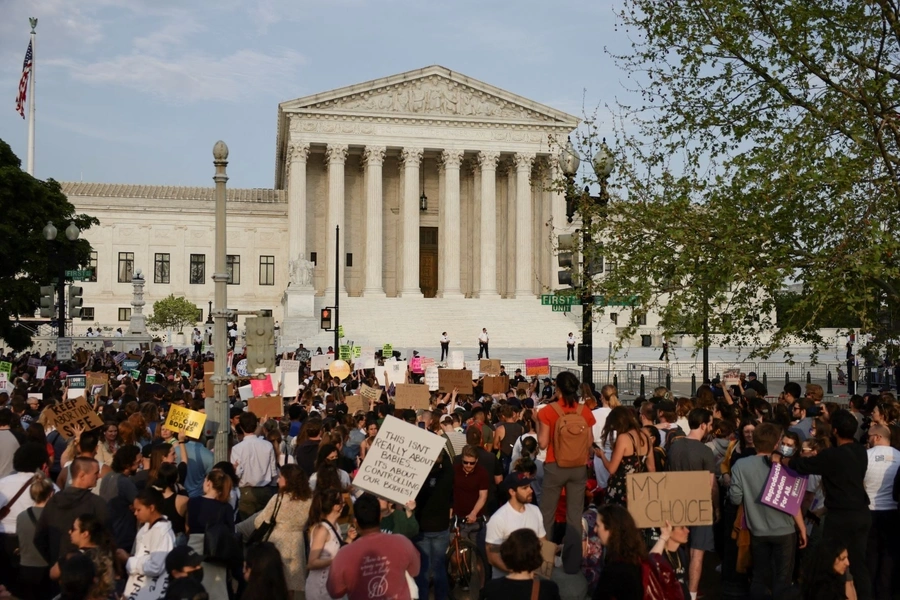 About eight-in-ten Democrats and Democratic-leaning independents (82%) disapprove of the court’s decision, including nearly two-thirds (66%) who strongly disapprove. Most Republicans and Republican leaners (70%) approve of the court’s ruling; 48% strongly approve.
About eight-in-ten Democrats and Democratic-leaning independents (82%) disapprove of the court’s decision, including nearly two-thirds (66%) who strongly disapprove. Most Republicans and Republican leaners (70%) approve of the court’s ruling; 48% strongly approve.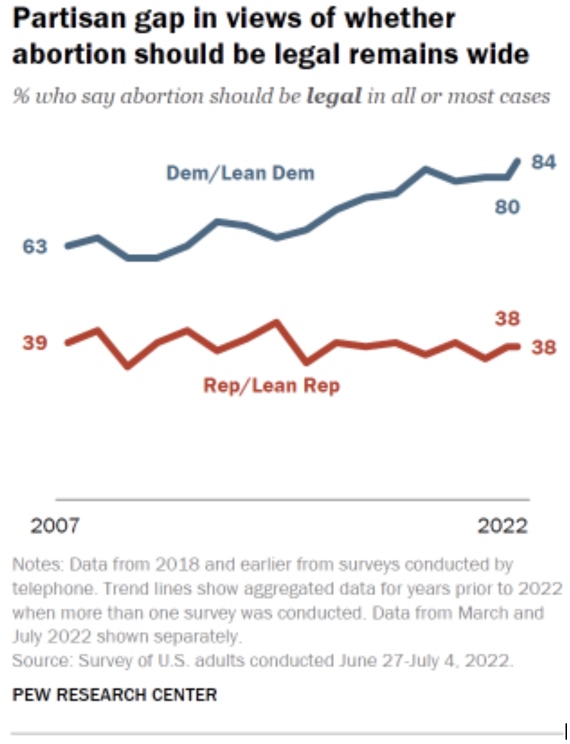 The partisan divide in abortion opinions remains wide. In the new survey, 84% of Democrats say abortion should be legal in all or most cases, compared with 38% of Republicans.
The partisan divide in abortion opinions remains wide. In the new survey, 84% of Democrats say abortion should be legal in all or most cases, compared with 38% of Republicans. About one-in-five Republicans (22%) say that while they would like Trump to continue to be a major political figure in the United States, they would prefer he use his stature to support another presidential candidate who shares his views in the 2024 election rather than run for office himself. About a third of Republicans (32%) say they would not like Trump to remain a national political figure for many years to come.
About one-in-five Republicans (22%) say that while they would like Trump to continue to be a major political figure in the United States, they would prefer he use his stature to support another presidential candidate who shares his views in the 2024 election rather than run for office himself. About a third of Republicans (32%) say they would not like Trump to remain a national political figure for many years to come. It’s been a rapid descent for Biden. As late as June, 56% approved of how he was doing while only 40% disapproved. The decline began in July (50% approve/46% disapprove) and in August roughly the same number approved (49%) as disapproved (48%). The decline in Biden’s numbers is almost entirely attributable to independents souring on him. In June, 55% of those not affiliated with either party approved of how Biden was handling the presidency. Today that number sits at just 37%.
It’s been a rapid descent for Biden. As late as June, 56% approved of how he was doing while only 40% disapproved. The decline began in July (50% approve/46% disapprove) and in August roughly the same number approved (49%) as disapproved (48%). The decline in Biden’s numbers is almost entirely attributable to independents souring on him. In June, 55% of those not affiliated with either party approved of how Biden was handling the presidency. Today that number sits at just 37%.  A major new Pew Research Center survey of religion across India, based on nearly 30,000 face-to-face interviews of adults conducted in 17 languages between late 2019 and early 2020 (before the
A major new Pew Research Center survey of religion across India, based on nearly 30,000 face-to-face interviews of adults conducted in 17 languages between late 2019 and early 2020 (before the  Even though Hindu BJP voters who link national identity with religion and language are more inclined to support a religiously segregated India, they also are more likely than other Hindu voters to express positive opinions about India’s religious diversity. Nearly two-thirds (65%) of this group – Hindus who say that being a Hindu and being able to speak Hindi are very important to be truly Indian and who voted for the BJP in 2019 – say religious diversity benefits India, compared with about half (47%) of other Hindu voters. This finding suggests that for many Hindus, there is no contradiction between valuing religious diversity (at least in principle) and feeling that Hindus are somehow more authentically Indian than fellow citizens who follow other religions.
Even though Hindu BJP voters who link national identity with religion and language are more inclined to support a religiously segregated India, they also are more likely than other Hindu voters to express positive opinions about India’s religious diversity. Nearly two-thirds (65%) of this group – Hindus who say that being a Hindu and being able to speak Hindi are very important to be truly Indian and who voted for the BJP in 2019 – say religious diversity benefits India, compared with about half (47%) of other Hindu voters. This finding suggests that for many Hindus, there is no contradiction between valuing religious diversity (at least in principle) and feeling that Hindus are somehow more authentically Indian than fellow citizens who follow other religions.